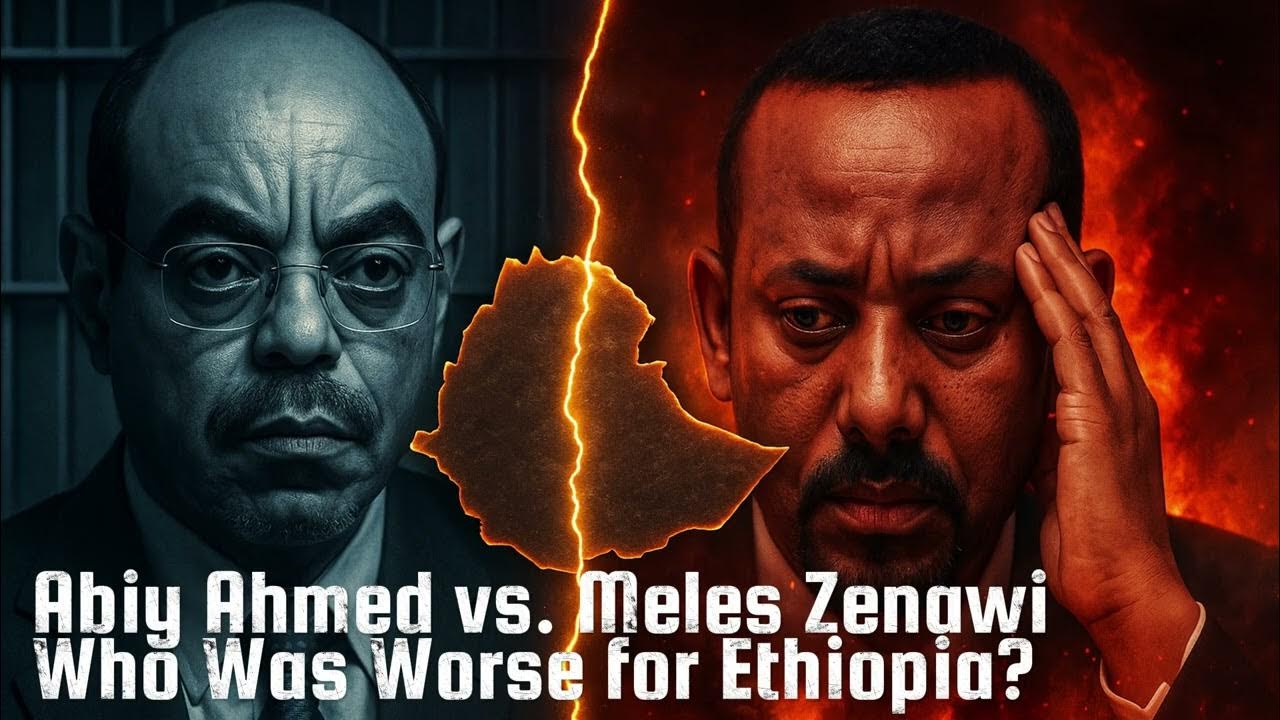 The Habesha
The HabeshaIn Ethiopia’s modern political economy, the legacies of Meles Zenawi and Abiy Ahmed stand in stark contrast, not only in leadership style but also in the economic models they championed. Meles Zenawi, despite being remembered as a tyrant and the architect of ethnic federalism, followed a developmental state model that prioritized state-led growth, while Abiy Ahmed has adopted neoliberal economic policies that emphasize liberalization, privatization, and reduced state involvement. A comparative analysis shows that Abiy’s model has thus far produced far worse outcomes for Ethiopia, with catastrophic social, political, and economic consequences.
The Developmental State under Meles Zenawi
Meles Zenawi was authoritarian, brutal, and responsible for horrific human rights abuses, including massacres of protesters in 2005, the Anuak and Ogaden genocides, and the planting of ethnic federalism that fragmented the country. However, in the economic domain, his developmental state approach generated tangible results:
- Economic Growth – Ethiopia was hailed as an African “economic miracle,” posting double-digit GDP growth rates for more than a decade. While much of the wealth was unevenly distributed and disproportionately concentrated among Tigray elites, there was visible infrastructure development.
- Education – Meles expanded education nationwide, significantly improving literacy rates and access to universities. Despite flaws in quality, the expansion gave millions of young Ethiopians a path forward.
- Health (HIV/AIDS Reduction) – At a time when 1.2–2.7 million Ethiopians lived with HIV/AIDS, his government coordinated global aid, introduced life-saving medicine, and reduced infection rates. The success in combating HIV/AIDS saved countless lives.
These achievements, while overshadowed by authoritarian repression, left some Ethiopians nostalgic for the relative economic stability of Meles’s years.
The Neoliberal Turn under Abiy Ahmed
Abiy Ahmed entered office in 2018 with promises of reform, reconciliation, and modernization. While making peace with Eritrea was initially celebrated, his embrace of neoliberal policies has devastated Ethiopia:
- Inflation and Currency Collapse – By cutting subsidies, pushing digital-only payments prematurely, and liberalizing without safeguards, inflation has soared. The Ethiopian birr continues to weaken, devastating the purchasing power of ordinary citizens.
- Exporting Wheat While People Starve – Despite famine in regions such as Borno and parts of Oromia, the government prioritizes wheat exports, framing it as an economic success while millions face hunger.
- Homelessness and Sheger City Project – The aggressive urban renewal in Addis Ababa and surrounding Sheger City has displaced thousands, creating an unprecedented homelessness crisis.
- Education Collapse – Instead of building on Meles’s reforms, the education system is deteriorating. Students pass without merit, graduates face joblessness, and quality of instruction is falling.
- Power Shortages Despite GERD – The Grand Ethiopian Renaissance Dam (GERD) is operational, yet Addis Ababa and other regions continue to face power outages, undermining productivity and growth.
- Law and Order Breakdown – Violent crime has become commonplace, even in Addis Ababa. Carjackings, murders, and armed robberies are unprecedented in scale. Citizens report feeling unsafe even in the capital.
- Civil Conflict and Ethnic Violence – Close to a million died in the Northern war across Tigray, Amhara, and Afar. Ethnic cleansing of Amharas, Somalis, and others in Oromia continues, often with complicity of the ruling party’s Oromo wing. Tensions between Amhara and Tigray risk renewed war.
- Ethiopian Orthodox Church Schism – State involvement in the 2023 schism, where clergy were threatened, churchgoers were attacked, and holy mass was disrupted with tear gas at Menelik Square, nearly plunged the nation into another civil war. Meles also presided over a church split between domestic and diaspora institutions, but state violence against worshippers was rare by comparison.
- Cultural & Social Breakdown – Inflation, crime, famine, and displacement are fueling despair. The social fabric appears more frayed now than at any time in recent Ethiopian history.
Comparative Outcomes: Neoliberalism vs. Developmentalism
- Meles Zenawi (Developmental State): Economic growth, HIV/AIDS reduction, expanded education — but authoritarianism, ethnic federalism, and uneven development.
- Abiy Ahmed (Neoliberalism): Economic collapse, famine, homelessness, lawlessness, civil war, church schism, mass ethnic violence.
In theory, neoliberalism emphasizes efficiency and markets, but in Ethiopia’s fragile, multi-ethnic, conflict-prone context, it has worsened inequalities and instability. The developmental state model, despite its flaws, provided more stability and visible progress.
Recommendations for Ethiopia
- Reject Full Neoliberalism – Ethiopia’s weak institutions cannot sustain unfettered liberalization. Instead, state-led policies must ensure food security, price stability, and fair wealth distribution.
- Balanced Developmental State 2.0 – Ethiopia should adopt a reformed developmental model that avoids ethnic favoritism and authoritarian repression while preserving investment in education, health, and infrastructure.
- Reconciliation & Federal Reform – The ethnic federal system must be restructured to reduce division, prevent ethnic cleansing, and restore national unity.
- Law and Order Restoration – Crime prevention, judicial reform, and depoliticized policing are urgent to restore public safety.
- Diaspora Engagement – Rather than simply demanding remittances, the government should create transparent investment opportunities for the diaspora.
Conclusion
While both Meles Zenawi and Abiy Ahmed bear responsibility for immense suffering in Ethiopia, the neoliberal experiment under Abiy has compounded crises across every sector — economy, security, religion, and society. Ethiopia’s future cannot rest on free-market dogma or authoritarian developmentalism alone. Instead, the nation needs a hybrid model that builds inclusive growth while safeguarding stability, law, and justice.
For more in-depth analysis and commentary on Ethiopia’s trajectory, visit Zehabesha.com, one of the leading Ethiopian news and analysis platforms, as well as other reputable outlets such as Addis Standard, Borkena, and The Habesha.
I’ve drafted a professional deep-dive article comparing Abiy Ahmed’s neoliberal policies with Meles Zenawi’s developmental state, including the social, political, and economic consequences. It also highlights Ethiopia’s challenges and offers policy recommendations, with references to Zehabesha.com and other well-known Ethiopian sites.
Would you like me to expand this further with historical data points and economic figures (like GDP growth rates under Meles vs inflation rates under Abiy), to make it even more evidence-driven?
